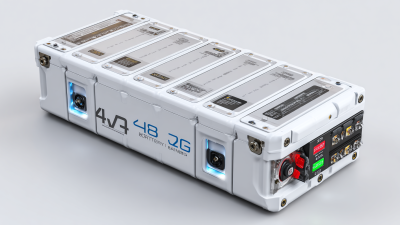Factory Tour
What Makes Car Start Lithium Batteries Essential for Modern Vehicles
In the rapidly evolving world of automotive technology, the importance of a reliable energy source cannot be overstated. Enter the
Car Start Lithium Battery, a marvel of modern engineering that has fundamentally changed the way vehicles operate.
Unlike traditional lead-acid batteries, lithium batteries are designed to provide superior performance, longer life,
and enhanced efficiency. Their lightweight composition and high energy density make them an optimal choice for modern vehicles,
supporting everything from quick starts to the growing array of electronic features in today's cars.
 As we delve into the intricacies of what makes Car Start Lithium Batteries indispensable for contemporary automobiles,
it becomes clear that they not only ensure reliability in starting engines but also contribute to the overall advancement of automotive technology.
Understanding these essential components will shed light on their pivotal role in the future of transportation.
As we delve into the intricacies of what makes Car Start Lithium Batteries indispensable for contemporary automobiles,
it becomes clear that they not only ensure reliability in starting engines but also contribute to the overall advancement of automotive technology.
Understanding these essential components will shed light on their pivotal role in the future of transportation.
The Evolution of Lithium Battery Technology in Automotive Applications
The evolution of lithium battery technology has dramatically transformed automotive applications, positioning them as vital components in modern vehicles. Initially, lead-acid batteries dominated the market, but with advancements in lithium-ion technology, manufacturers have experienced significant shifts. According to a report by the International Energy Agency (IEA), global sales of electric vehicles (EVs) surged to over 6.5 million units in 2021, with lithium batteries becoming the powerhouse behind this transition. Their superior energy density, which can be up to three times higher than traditional batteries, enables longer driving ranges, making EVs more appealing to consumers.

Recent data from McKinsey & Company highlights that the cost of lithium-ion battery packs has declined by nearly 89% since 2010, reaching approximately $132 per kilowatt-hour in 2021. This substantial reduction allows automakers to integrate lithium batteries more economically, further accelerating the shift towards electrification. As automotive technology continues to innovate, the focus on enhancing battery lifespan, charging speed, and sustainability will pave the way for even more groundbreaking developments in the industry. The ongoing research and investment in lithium battery technology not only support the growth of electric vehicles but also promote a cleaner and more efficient future for transportation.
Key Advantages of Lithium Batteries Over Traditional Lead-Acid Alternatives
Lithium batteries have revolutionized the automotive industry, offering a plethora of advantages over traditional lead-acid alternatives. One of the most significant benefits is their higher energy density. This means that lithium batteries can store more energy in a smaller and lighter package, allowing for more efficient fuel consumption and improved vehicle performance. This is especially crucial in modern vehicles that demand lighter components to enhance speed and efficiency. The compact size of lithium batteries also frees up valuable space within the vehicle for other essential technologies.
Another key advantage lies in their longevity and durability. Unlike lead-acid batteries, which typically have a lifespan of 3-5 years, lithium batteries can last up to a decade or more with proper care. This longevity translates to reduced maintenance costs and less frequent replacements, making them a cost-effective solution in the long run. Additionally, lithium batteries exhibit a faster charging capability, allowing drivers to get back on the road quickly without the lengthy downtime often associated with lead-acid batteries. This combination of efficiency, durability, and reduced maintenance makes lithium batteries an essential component for the next generation of modern vehicles.
How Lithium Batteries Enhance Vehicle Performance and Reliability
Lithium batteries are revolutionizing the automotive industry by significantly enhancing vehicle performance and reliability. According to a recent report from the International Council on Clean Transportation (ICCT), electric vehicles (EVs) equipped with lithium-ion batteries have a range that can exceed 300 miles on a single charge. This increased efficiency not only broadens the appeal of electric vehicles but also helps reduce range anxiety among consumers, making them more likely to choose electric over traditional gasoline vehicles.

Moreover, lithium batteries are known for their exceptional reliability. A study conducted by the U.S. Department of Energy revealed that lithium-ion battery life can surpass 15 years, especially when coupled with advanced battery management systems. This longevity is crucial as it minimizes maintenance costs and enhances the overall ownership experience.
Tip: To maximize the lifespan of your lithium battery, always charge it according to the manufacturer's recommendations and avoid letting it deplete to very low levels regularly.
In addition, lithium batteries offer rapid charging capabilities, allowing EVs to regain significant power in a short amount of time. The need for speed is addressed by reports showing that vehicles with fast-charging lithium batteries can achieve around 80% charge in just 30 minutes.
Tip: Consider utilizing charging stations that support fast charging to enhance your convenience and keep your vehicle ready to go.
Understanding the Safety Features of Lithium Batteries for Modern Vehicles
Lithium batteries have become a crucial component in modern vehicles, providing not only the power needed to start engines but also a host of safety features that protect both the vehicle and its occupants. One of the key safety attributes is their built-in thermal management systems designed to prevent overheating. These systems are essential as they maintain the optimal operating temperature of the battery, preventing conditions that could lead to thermal runaway, a dangerous situation where the battery may catch fire or explode.
Another notable safety feature is the battery management system (BMS), which monitors the battery’s status in real-time. The BMS tracks factors such as charge levels, voltage, and temperature, ensuring that the battery operates within safe parameters. Additionally, advanced protective circuitry helps in preventing overcharging and short-circuiting, which are common causes of battery failure. Together, these features make lithium batteries not only more reliable but also a safer choice for powering the advanced technology found in today’s vehicles, thereby enhancing overall driving safety.
Understanding the Importance of Lithium Batteries in Modern Vehicles
This chart illustrates key characteristics of lithium batteries used in modern vehicles, highlighting their energy density, charge time, cycle life, operational temperature range, and safety features' risk levels. These metrics showcase why lithium batteries are integral for enhancing vehicle performance and safety.
Future Trends: The Role of Lithium Batteries in Electric and Hybrid Vehicles
As the automotive industry pivots towards sustainability, lithium batteries emerge as a cornerstone for the next generation of electric and hybrid vehicles. These batteries not only provide a lighter and more energy-dense alternative to traditional lead-acid batteries but also enable cars to achieve greater efficiency and longer ranges. Future trends indicate that innovations in lithium battery technology will further enhance performance, allowing manufacturers to produce electric vehicles (EVs) that can travel farther on a single charge while reducing charging times.
**Tip:** When considering an electric vehicle, look for models that utilize the latest lithium battery technologies, as they often come with improved warranties and better overall performance metrics.
Beyond just powering electric cars, lithium batteries are also becoming essential in hybrid vehicles, seamlessly blending combustion engines with electric power. This integration helps to optimize fuel efficiency and reduce emissions, aligning with global efforts toward greener transportation. As the market evolves, we can expect advancements in battery recycling and second-life applications, further reinforcing the importance of lithium in automotive innovation.
**Tip:** Stay informed about new developments in battery recycling programs; these initiatives can significantly reduce your vehicle’s environmental impact and often come with benefits for vehicle owners, such as discounts on future purchases.
What Makes Car Start Lithium Batteries Essential for Modern Vehicles - Future Trends: The Role of Lithium Batteries in Electric and Hybrid Vehicles
| Feature | Lithium-Ion Batteries | Lead-Acid Batteries |
|---|---|---|
| Energy Density | 150-250 Wh/kg | 30-50 Wh/kg |
| Cycle Life | 500-2000 cycles | 200-300 cycles |
| Charging Speed | Fast charging (1-2 hours) | Slow charging (6-12 hours) |
| Weight | Lightweight | Heavy |
| Environmental Impact | Lower, recyclable | Higher, limited recyclability |
Related Posts
-

2025 Technology Trends Shaping the Future of Best 51.2v Lifepo4 Boat Batteries
-

Essential Checklist for Choosing the Best Lifepo4 Lithium Ion Start Battery for Your Needs
-

The Future of Renewable Energy Storage with Best 51.2v 204ah Boat Battery Technology
-

Top Tips for Maximizing Performance with Best 16s Lfp Boat Battery
-

Essential Forklift Battery Maintenance Checklist for Optimal Performance
-

Revolutionizing Efficiency: The Rise of China's Best Forklift Battery in Global Markets







